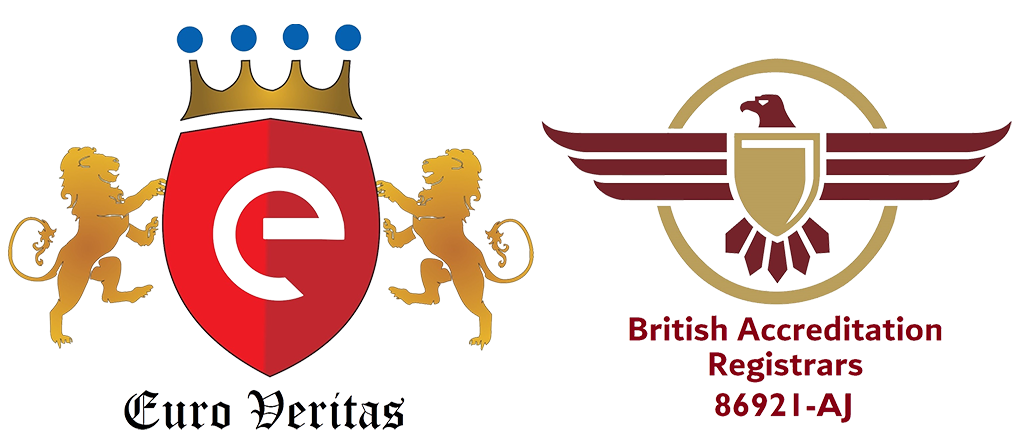About Euro Veritas
About Euro Veritas

Certification – the provision by Euro Veritas of written assurance (a certificate) that the product, service or system or person in question meets specific requirement.
Registration / Compliance – certification is very often referred to as registration / compliance.
Accreditation – the formal recognition by an independent body- BAR-UK (British Accreditation Registrars, UK), generally known as an accreditation body that a certification body is capable of carrying out certification. Accreditation is not obligatory but it adds another level of confidence, as ‘accredited’ means the certification body has been independently checked to make sure it operates according to international standards.
As ISO does not perform certification, Organizations looking to get certified to an ISO standard must contact an independent certification body like Euro Veritas, which is accreditated by BAR-UK.
Euro Veritas has implemented a system compliant with the requirements of ISO 17021 for system Certifications and has henceforth been accreditated from BAR-UK. View Accreditation Certificate.
Euro Veritas has implemented a system compliant with the requirements of ISO 17020 as an Inspection Body and has henceforth been accreditated from BAR-UK. View Accreditation Certificate.
Euro Veritas has implemented a system compliant with the requirements of ISO 17065 as an Product Certification agency and has henceforth been accreditated from BAR-UK. View Accreditation Certificate.
Euro Veritas has implemented a system compliant with the requirements of ISO 17024 as a Personnel Certification Body and has henceforth been accreditated from BAR-UK. View Accreditation Certificate.
What accredited certification from BAR-UK to Management System Standards mean :
To achieve conforming products, the accredited certification process is expected to provide confidence that the organization has a quality management system that conforms to the applicable requirements of various Management System Standards. In particular, it is to be expected that Euro Veritas:
A. has established a quality management system that is suitable for its products and processes, and appropriate for its certification scope.
B. analyzes and understands customer needs and expectations, as well as the relevant statutory and regulatory requirements related to its products.
C. ensures that product characteristics have been specified in order to meet customer and statutory/regulatory requirements.
D. has determined and is managing the processes needed to achieve the expected outcomes (conforming products and enhanced customer satisfaction).
E. has ensured the availability of resources necessary to support the operation and monitoring of these processes.
F. monitors and controls the defined product characteristics.
G. aims to prevent nonconformities, and has systematic improvement processes in place to.
• Correct any nonconformities that do occur (including product nonconformities that are detected after delivery)
• Analyze the cause of nonconformities and take corrective action to avoid their recurrence
• Address customer complaints
H. has implemented an effective internal audit and management review process.
I. is monitoring, measuring and continually improving the effectiveness of its quality management system.
What accredited certification to various standards does not mean ?
1) It is important to recognize that certification of compliance defines the requirements for an organization’s quality management system, not for its products. Accredited certification to ISO 9001 should provide confidence in the organization’s ability to “consistently provide product that meets customer and applicable statutory and regulatory requirements”. It does not necessarily ensure that the organization will always achieve 100% product conformity, though this should of course be a permanent goal.
2) Accredited certification does not imply that the organization is providing a superior product, or that the product itself is certified as meeting the requirements of an ISO (or any other) standard or specification.
3) An Accreditated Certificate to some individually developed schemes from BAR-UK does not mean any kind of association with a particular external board.
4) The certified organization shall indemnify Euro Veritas of any non-compliance issues which might arise due to non-compliance from the certified company, any non-acceptance with any external party etc.
Having scrutinized this entire work and its topic we are able to draw certain conclusions focusing on the main reasons for using services of accredited certification bodies:
• Risk reduction
• Reduction of costs
• Growth of reputation and business recognition
• New possibilities- companies can improve their performances during the certification activities which opens new possibilities overlooked previously
• International recognition
• Possibilities for signing new deals- there are many examples where offerors are required to provide certified management systems for bidding purposes and where an offeree opts for an offeror certified by accredited certification body


